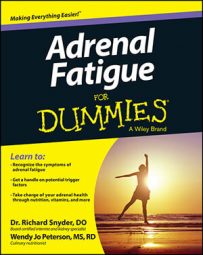Here are some of the big guns — herbs that can provide the adrenal glands with the boost they need when you're dealing with adrenal fatigue and especially with adrenal exhaustion. You can add these to your regimen when the symptoms of adrenal fatigue either don't abate or worsen. Many of these items also help to reduce the effects of stress.
The following herbs are called adaptogens, which are plants that practitioners of herbal medicine believe decrease cellular sensitivity to stress. These herbs help restore balance not only to the adrenal glands but also to the entire body. They help the adrenal glands cope with the stress response, partly by de-stressing the adrenal glands and partly by providing a boost to adrenal gland function.
Again, before you start the following herbs, you should check in with your healthcare provider to see whether they may be helpful for you.
Think of these herbs as providing a major tune-up to fatigued adrenal glands, allowing your body to run better and more efficiently.
Ashwagandha
Ashwaghanda (Withania somnifera) is an herb that can improve your response to stress. Over the centuries (yes, it's been used in Ayurvedic medicine for centuries), people have viewed ashwagandha as a substance that helps the body rejuvenate itself.
An interesting study published in the Indian Journal of Psychological Medicine in 2012 enrolled approximately 60 individuals who had a clinical history of being chronically stressed. Half the participants received a placebo, and the other half was treated with a dose of 300 milligrams of ashwagandha daily.
Those who were treated with this herb noticed an improvement in overall quality of life and in how they responded to stress, as evaluated through stress-assessment questionnaires. Those treated with ashwagandha showed a substantial decrease in stress scores when compared to the placebo group.
The investigators also noted another important finding: The blood levels of cortisol were lower in the group treated with ashwagandha than in the control group. Ashwagandha appeared to provide a boost that the adrenal glands needed.
Ashwagandha is available in several forms, including root and extract forms. An average capsule dose is approximately 500 to 600 milligrams, depending on the brand. To start, take this herb once a day, and after 3 to 4 weeks, you can increase the dose to twice a day.
Eleuthero
Eleuthero (Eleutherococcus senticosus), formerly referred to as Siberian ginseng, is a great herb that can help improve the adrenal glands’ response to stress. It helps boost the function of the adrenal glands. Eleuthero has also been shown to help boost the immune system. And here's a bonus: It's helpful in improving cognition.
Eleuthero can be taken in capsule form or in liquid form. A usual dose of the capsule form is 400 to 500 milligrams once a day, depending on the brand.
Licorice
Licorice (also known as glycyrrhizic acid ) is commonly recommended for treating hypotension (low blood pressure) in adrenal fatigue. Hypotension often occurs in the latter stages of adrenal fatigue, and licorice can be a tremendous help.
Licorice is available in capsule form. The recommended dosage is approximately 1 to 2 grams in divided doses, taken twice a day.
Because licorice can cause too little potassium (hypokalemia), your healthcare practitioner needs to follow your potassium levels, which can be done with a simple blood test.
Don't use licorice if you have high blood pressure (hypertension); use it only if your blood pressure is low or if you experience dizziness when standing up (a sign of orthostatic hypotension). Talk with your healthcare practitioner if you have any heart problems. Given the risk of low potassium and licorice's potential interaction with heart medications, including digoxin, you may need to avoid licorice if you have any heart problems.
Rhodiola
Rhodiola is a genus of herbs that's beneficial not only for reducing stress and boosting adrenal function but also for improving sleep quality.
A study from the journal Planta Medica in 2009 evaluated the effects of Rhodiola on reducing stress and fatigue. Sixty individuals were divided into two groups; one group received a placebo, and another received Rhodiola. The study participants were followed for 4 weeks.
At the end of the study, the participants who had taken Rhodiola reported increased endurance, increased mental clarity, and a better ability to concentrate on tasks. The researchers also noted that the Rhodiola group had decreased cortisol levels when compared to those in the placebo group.
Rhodiola comes in several forms. An average starting dose is 400 milligrams a day, usually taken before a meal.

